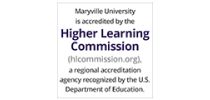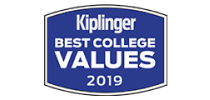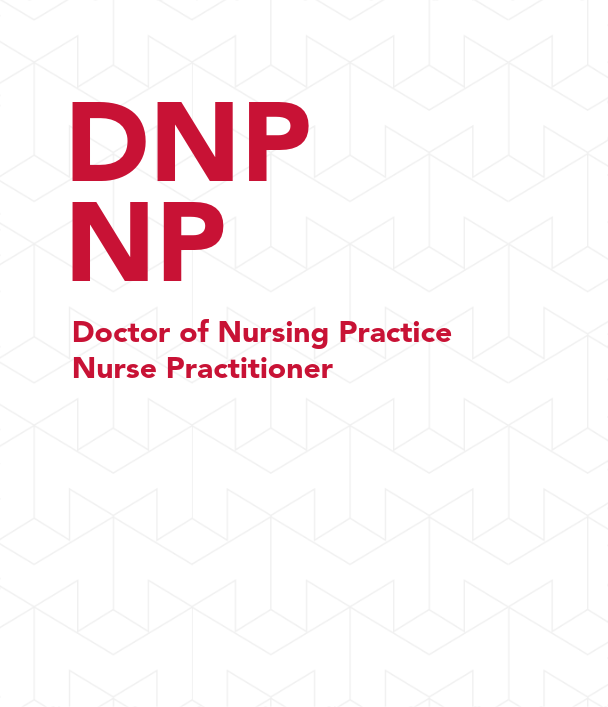Online Doctor of Nursing Practice (DNP) and Doctor of Nursing Practice – Nurse Practitioner (DNP-NP)
Overview

Why choose Maryville’s accredited online DNP programs?
- Access coursework 100% online with no campus visits required.
- Apply with no GMAT or GRE scores required.
- Earn your DNP in as few as 20 months or your DNP-NP in as few as 36 months.
- Complete clinicals locally in your preferred setting.
- Enjoy no waiting list once you’re accepted.

Bravely lead the future of nursing practice with your DNP
Maryville’s online Doctor of Nursing Practice (DNP) programs are ideal for experienced nurses who want to prepare to advance their careers by earning the highest credential in nursing practice education.
If you’re already a nurse practitioner, you can earn your DNP in as few as 20 months — or add a concentration to become a DNP-NP in as few as 36 months.
Either way, you can build the skills to become a leader in evidence-based practice, quality improvement, and systems leadership.

Earn your online DNP with Maryville and prepare to go further
- Graduate from a program accredited by the Commission on Collegiate Nursing Education (CCNE).
- Enjoy the convenience of a 24/7 online learning model that allows you to plan time for work, life, and family.
- Get personalized support to help you achieve your academic goals and go further in nursing.
- Conduct research via clinical inquiry courses and an experiential, future-focused curriculum designed to prepare you for real-world practice.
- Learn from experienced faculty and nursing leaders who know what it takes to excel and achieve goals in public health and nursing.





Important dates for 2026
Program details

The Maryville online DNP programs are designed to:
- Prepare you for more autonomy and professional growth
- Develop your expertise with a focus on the scientific underpinnings of nursing, healthcare policy, and organizational leadership
- Help you advance your credentials and improve patient care in your specialization
- Equip you for the complexities of community healthcare needs
- Expand your knowledge of evidence-based practice, clinical care research, patient outcomes, and clinical systems management

Online DNP programs: Should I choose a DNP and DNP-NP?
Even if you’ve already earned your master’s degree and established an advanced nursing career, you still feel driven to go further, accomplish more, and keep learning.
With your doctorate, you can gain even more satisfaction, momentum, confidence, and experience. At Maryville, we offer two pathways toward earning your DNP, depending on your goals and professional background.
- DNP: For advanced practice nurses who have completed their MSN and wish to earn a terminal degree. This pathway includes the DNP degree only.
- DNP-NP: For nurses who have completed their MSN and wish to become NPs (or earn a second NP certificate) while earning a terminal degree.

DNP: A deeper look
A DNP degree can equip you with the skills you’ll need to pursue a wide range of advanced healthcare positions, including patient care, specialized careers, administrative leadership positions, policy roles, and academic positions.
All these roles offer the opportunity to improve patients’ lives and make healthcare better, whether by leading other nurses, educating future nurses, or influencing health policy.
This pathway can be completed more quickly, taking about 20 months to complete, and includes only the DNP — it’s not intended to prepare you for additional NP certification, but rather to equip you with doctorate-level nursing skills to advance the care you provide or pursue leadership roles.

DNP-NP: A deeper look
The DNP-NP creates a pathway to earn your DNP while also completing the credits needed to take the NP credentialing examination and earn your NP certification. You can choose from five concentrations, so you can build your education around your practice goals.
This pathway takes longer to complete — about 36 months instead of 20 — but includes all the additional coursework to help you prepare for the NP certification exam in your chosen field. For that reason, this pathway allows for the possibility of using your DNP to expand your nursing practice and skill set or to move into a role in administration, policy, leadership, or education.

Five ways to specialize your online DNP-NP:
If you choose the DNP-NP route, you have a choice of five in-demand concentrations for the NP portion of your education. Choose from the following:

Why earn your Doctor of Nursing Practice (DNP) degree?
You’re already an established nurse. Now is your chance to earn your terminal nursing degree and advance to the top echelon of your field, enhance your practice, or move into leadership.
See how our online DNP or DNP-NP degrees can help you achieve more in nursing.

DNP vs. PhD in Nursing
Compared with a PhD, which prepares scholars for research and other academic careers, a DNP is designed to empower you to become a leader in clinical practice, where you can work to improve healthcare outcomes and nursing management.
If you’re hoping to continue in patient care as an advanced nurse, the DNP is the right choice for your goals.

The field needs you now
As healthcare evolves and becomes more complex, the demand for advanced practice nurses is growing across the country. An aging population, increased focus on long-term or preventive care, nursing and physician shortages, and the impending retirement of older healthcare professionals are further driving this need.
The strength and stability of our healthcare system depends on the recruitment of qualified and capable leaders in nursing practice — leaders like you.

Dedicated student support from application through graduation
At Maryville, we measure our success by your success. That’s why we’re here for you throughout your nursing education, providing dedicated and individualized learner support that fits your specific needs and expectations. Get the tools and help to succeed through resources like:
- Personalized student support advising
- 24/7 technical help desk
- Online study and tutoring services
- Access to the library and other learning tools
Learn more about our dedicated student support coaches here.
Careers

What can you do with your online DNP degree?
Your career requires you to make decisions that affect people’s lives every day. When you earn your online DNP or DNP-NP with Maryville, you can pursue more meaningful and higher-level roles that allow you to make a bigger impact with your patients, in your community, and around your field.
Reach the pinnacle of your nursing career with your online DNP from Maryville.

Online DNP program graduates career outlook summary
There’s a trend toward higher autonomy and more responsibilities for graduate-educated nurses and NPs in many states across the country. This is due to factors like increased complexity and changing regulations in healthcare, a greater focus on preventive care and wellness, and noted shortages among nurses, physicians, and other medical professionals.
This is especially true for doctorate-level nurses, as the extra education and higher level of training they receive may qualify them to pursue higher-level patient care roles and leadership positions.

Career prospect statistics for DNP-educated nurses and NPs
- The U.S. Bureau of Labor Statistics projects job openings for high-level nursing professionals, such as NPs, to grow by 35% between 2024 and 2034.
- NPs and highly educated and qualified nursing professionals may fill crucial healthcare needs as we face a shortage of 86,000 primary and specialty physicians by 2036, according to a report by the Association of American Medical Colleges.
- Psychiatric, pediatric, family, and gerontological NPs rank among the top 11 highest-paying nursing roles, according to online career resource Indeed.
- While an MSN is still the standard education requirement to become an NP, the American Association of Colleges of Nursing (AACN) and the National Organization of Nurse Practitioner Faculties (NONPF) have recommended moving toward the DNP as a new standard.

DNP-educated nursing professionals are industry difference-makers
The DNP is a flexible, versatile credential that can empower you to take advantage of opportunities across a diverse number of settings. Trends in nursing like the emergence of nurse-run clinics to meet community healthcare demand, rising healthcare needs of an aging population, and increasingly complex healthcare systems present avenues by which DNPs can find success and meaningful work.
Education is another area where DNPs may fill crucial roles. According to the AACN, U.S. nursing schools have turned away more than 80,000 qualified applicants in recent years due to factors like insufficient faculty. Nursing education is one area in which DNP-educated professionals can impact the field as a whole.

What can online DNP or DNP-NP graduates do?
As a terminal degree in nursing, your DNP can help you pursue career interests beyond gaining more autonomy, specializing your practice, or earning higher pay. Some ways DNP-educated nursing professionals use their knowledge and skill set include the following.
- Conduct clinical research.
- Sponsor and promote legislative change in healthcare policy.
- Apply evidence-based research to improve the quality of patient care.
- Advocate for patient safety rights and practices.
- Drive collaborative projects as a leader for the future of nursing.
- Become a key decision-maker in an executive suite or government office.
- Open an autonomous practice (24 states now permit those with a DNP to open their own clinics).

What areas can I specialize in with my DNP-NP at Maryville?
We offer five NP concentrations designed to help you prepare for meaningful work in high-impact nursing concentrations:

What careers can I pursue with my online DNP or DNP-NP?
In addition to pursuing certification and becoming an NP, you may thrive in areas like nursing administration, policy, education, clinical training, executive leadership, and nursing informatics. DNP-prepared nurses can consider pursuing roles elsewhere in the field such as:
- Chief nurse anesthetist
- Chief nursing officer
- Director of nursing services
- Health policy analyst
- Hospital CEO
- Medical and health services manager
- Nursing manager or supervisor
- Nurse midwife
- Nursing professor
Find out more about DNP and DNP-NP careers here.

Where do DNPs find job opportunities?
With your DNP, you can pursue work in a wide array of settings and offices within or adjacent to the healthcare system. These include the following.
- Administrative and political offices
- Behavioral health clinics
- Colleges and universities
- Community health centers
- Hospitals and clinics
- Long-term care facilities
- Nursing research facilities
- Pediatric clinics
- Rehabilitation facilities
- Retirement homes
- Specialty practice, such as cardiology or oncology

What is the typical salary for online DNP program graduates?
According to data compiled by the career resource PayScale, the average base salary for people who hold a DNP was about $115,000 per year as of 2025. That average includes self-reported data across a variety of career types.
In general, careers that require or recommend a DNP are high-paying and rewarding, with NP and patient care salaries tending to be higher than administrative and non-practice salaries. For example, the U.S. Bureau of Labor Statistics reports that the median salary for NPs in 2024 was about $129,000.
Because of the wide variety of nursing and nursing-related positions you can pursue with a DNP, your salary may vary depending on factors like discipline, years of experience, certification, location, and education level.

What are some careers I can pursue with my DNP?
With your DNP, you can pursue a variety of careers in clinical, patient-centered roles or nonclinical roles. Here are a few possibilities with associated average salaries.*
- Adult-gerontology nurse practitioner (acute or primary care): $108,000
- Family nurse practitioner (FNP): $105,000
- Pediatric nurse practitioner (PNP): $103,000
- Psychiatric mental health nurse practitioner (PMHNP): $123,000
- Chief nursing officer (CNO): $148,000
- Clinical nurse specialist: $104,000
- Director of nursing services: $102,000
- Nurse manager: $98,000
* Average salary information based on data compiled by PayScale as of 2025
Earn an education with a strong ROI
We’re proud to be recognized among the leaders in social mobility in our region*:
- No. 1 in social mobility among private colleges and universities in the St. Louis area
- No. 1 in lowest average debt among regional private peers
- Top 3 in St. Louis for graduation rates and early-career earnings
These rankings serve as indicators of strong ROI for our graduates — meaning your Maryville education can help you start faster and go further.
Testimonials
“The way that the curriculum is set up at Maryville, each semester built upon the previous one, so we’re learning as we go. It’s not an overwhelming process. A lot of times, that’s much like our careers are in the healthcare field. We all have something new to learn, every single day.”
— Tiffany N., graduate, Doctor of Nursing Practice
“With the DNP, it allows me to become a faculty member, or it allows me to become more understanding of research … in a clinical setting, which is huge. It gave me the self-confidence I have been looking for my whole adult life.”
— Megan J., graduate, Doctor of Nursing Practice
Flexibility and support to graduate with confidence
As a working nurse looking to take your next step, your schedule is packed. We offer the support, resources, and online flexibility to help you work around your professional and personal obligations to complete your DNP.
Working around her busy nursing schedule, 2025 grad Sarah Barney found success earning her DNP thanks to flexible coursework and an intuitive learning platform.
Curriculum
What is the curriculum for the online DNP and DNP-NP programs?
As you push toward the height of your nursing career, you’ll need an education that prepares you for the challenges you’ll face and the opportunities you’ll find. That’s what our online Doctor of Nursing Practice curriculum is designed to help you do.
Maryville’s programs offer you the chance to pursue your online DNP degree on its own (graduate in as few as 20 months) or with a nurse practitioner concentration (graduate in as few as 36 months, depending on the concentration you select).
Online DNP-NP curriculum
If you want to become an NP, you can develop those skills and build the knowledge to pursue certification while you earn your DNP online. If you choose this option, you’ll have the opportunity to take additional coursework covering graduate-level nursing, NP core competencies, and concentration-related topics and practice.
You’ll have the opportunity to build your general nursing skill set with courses such as Professional Role Development, and you’ll build your NP competencies through advanced courses in pathophysiology, health assessment, and pharmacotherapeutics.
You can start either program in the spring, summer, or fall. All courses can be completed 100% online.
Doctor of Nursing Practice (DNP) core and capstone courses
Doctor of Nursing Practice foundation courses (15 credit hours)
This course is designed to introduce students to the purpose, content, and methods of epidemiology and biostatistics. Students will learn to evaluate and use output from statistical computing software.
Prerequisite: NURS 710
This course is designed to explore the phenomenon of interest related to the DNP scholarly project. Students will systematically develop a project protocol that is supported by the literature and submit it for department approval.
Course objectives:
- Develop a clinical question that guides the scholarly project.
- Read critically from professional nursing literature and other related disciplines to interpret, analyze and apply current research to improve practice.
- Apply a systematic approach to address clinical problems within healthcare organizations, including outcome measures and a sustainability plan to create meaningful changes in clinical outcomes.
- Develop a protocol and submit it to the DNP council for project approval.
- Develop the first chapter of the scholarly project that includes needed sections based on the selected DNP project format.
This course is designed to emphasize an objective approach to the integration and synthesis of knowledge. Manuscript preparation and practical use of evidence are incorporated to prepare students for the design of research proposals.
Prerequisite: NURS 700 and NURS 701
This course is designed to provide an understanding of the measurement of phenomena as it relates to the research process. Procedures for selecting, applying, and interpreting the correct statistical application to a research problem will be presented with students processing the results.
Prerequisite: NURS 700
Doctor of Nursing Practice capstone courses (18 credit hours)
This course will allow the students to design an evidence-based project that will guide clinical practice. The feasibility of conducting this initiative will be explored. Potential funding sources and budget issues will be examined. Students will apply the elements of protection of human subjects and complete the Maryville IRB.
Prerequisite: NURS 700, NURS 701, NURS 702, and NURS 703
This course is designed to expand the students knowledge of clinical project data collection and analysis of data. Students will apply integrated research concepts pertaining to the clinical project. Utilization of various methods of data analysis and data management systems will be explored. Complete project data is needed prior to the start of this course.
Prerequisite: NURS 705 and NUS 705L
This course is designed to expand the students understanding of methods of dissemination in translational research. Variables that impact the analysis of data related to the scholarly project will be examined. Implications for patients, clinical practice and the healthcare systems will be explored and findings disseminated.
Prerequisite:NURS 706
Doctor of Nursing Practice with NP concentration (DNP-NP)
DNP-NP students complete the courses listed above plus 6 credit hours of graduate nursing core coursework, 11 hours of NP core coursework, and 18-21 hours of concentration coursework.
The total number of credit hours for DNP-NP learners depends on the concentration you choose:
- AGACNP: 68 credit hours
- AGPCNP: 68 credit hours
- FNP: 68 credit hours
- PNP: 68 credit hours
- PMHNP: 71 credit hours
Graduate nursing core courses (6 credit hours)
Nurse practitioner core courses (11 credit hours)
This course explores focused and comprehensive health assessments in a variety of settings and patients across the lifespan. This includes development of health promotion strategies and prioritization of care.
Prerequisite: Online - NURS 611, NURS 615
Corequisite: On Ground - NURS 615
This course focuses on the pharmacological foundation for safely prescribing medical regimens of illnesses for individuals across the lifespan. Also included are illness prevention, non-pharmacological and legal implications for prescriptive authority for the nurse practitioner.
Note: Selection of appropriate therapies, patient education and evaluation parameters are stressed.
AGACNP concentration curriculum (18 credit hours)
This is the first didactic management course in the Adult Gerontology Acute Care Nurse Practitioner program. Focus is on individuals experiencing illness seen in the acute care setting. Students will analyze practice guidelines and develop differential diagnoses, implement clinical judgment and decision-making, as it relates to evidence based care management.
Prerequisite: NURS 611, NURS 612, and NURS 615
Corequisite:NURS 641 or NURS 641C
First practicum course in the Adult Gerontology Acute Care Nurse Practitioner (AGACNP) program. Students will apply and integrate concepts presented in NURS-640 with focus on applying knowledge and skills in acute care practice settings.
Prerequisite:NURS 611, NURS 612, and NURS 615
Corequisite: NURS 640
This course is the second didactic management course in the Adult Gerontology Acute Care Nurse Practitioner program. Students will continue to expand on knowledge, decision making and management of acute and emergent physiological alterations in health. Students will analyze practice guidelines and develop differential diagnoses, implement clinical judgment and decision-making, as it relates to evidence based care management.
Prerequisite:NURS 640 and NURS 641 or NURS 641C
Corequisite: NURS 643 or NURS 643C
This is the second practicum course in the Adult Gerontology Acute Care Nurse Practitioner (AGACNP) program. Students will apply and integrate concepts presented in the NURS 642 with focus on comprehensive health care to complex, acute and critically ill patients in a clinical, preceptored practicum experience.
Prerequisite: NURS 640 and NURS 641
Corequisite:NURS 642
This is the final didactic management course in the Adult Gerontology Acute Care Nurse Practitioner (AGACNP) program. Students will continue to analyze practice guidelines and develop differential diagnoses, implement clinical judgment and decision-making, as it relates to evidence based care management in complex symptomology.
Prerequisite:NURS 640, NURS 641 or NURS 641C, NURS 642 and NURS 643 or NURS 643C
Corequisite: NURS 645 or NURS 645C
This is the final practicum course in the Adult Gerontology Acute Care Nurse Practitioner (AGACNP) program. The student will apply and integrate concepts presented in the NURS-644 with focus on comprehensive health care to complex, acute and critically ill patients in a clinical, preceptored practicum experience.
Prerequisite:NURS 642 and NURS 643
Corequisite:NURS 644
AGPCNP concentration curriculum (18 credit hours)
This course covers the care of adults experiencing acute, chronic and complex health problems of select body systems in this first of two sequential courses. Current research based interventions are analyzed. Individual, family, and group counseling/education for patients and families are incorporated. Included is primary, secondary and tertiary disease prevention and management of complex symptomatology.
Prerequisite:NURS 611, NURS 612, and NURS 615
Corequisite: NURS 621 or NURS 621C
This course will cover the theoretical, clinical and role components of care by an advanced practice nurse and are integrated in a supervised clinical practicum.
Prerequisite: NURS 611, NURS 612, and NURS 615
Corequisite:NURS 620
This course covers the care of adults experiencing acute, chronic and complex health problems of select body systems in this second of two sequential courses. Current research based interventions are analyzed. Individual, family, and group counseling/education for patients and families are incorporated. Included is primary, secondary and tertiary disease prevention and management of complex symptomatology.
Prerequisite: NURS 620 and NURS 621 or NURS 621C
Corequisite:NURS 624 or NURS 624C
This course will cover the theoretical, clinical and role components of care by an advanced practice provider and are integrated in a supervised clinical practicum. Opportunity is provided for the assessment, management, and evaluation of adults with chronic and acute health problems in a primary care setting.
Prerequisite:NURS 620 and NURS 621
Corequisite:NURS 623
The care of adults experiencing acute, chronic, and complex health problems are studied in this course specifically for students in the adult-gerontology nurse practitioner program. The course expands on current research-based interventions unique to adults of varying ages, from wellness to illness. Individual, family, group counseling, and education for patients and families are incorporated. Included is primary, secondary, and tertiary disease prevention and management of complex symptomatology.
Prerequisites: NURS 620, NURS 621, NURS 623, and NURS 624
Corequisite: NURS 627C
This course will cover the theoretical, clinical, and role components of care by an advanced practice nurse are integrated in a supervised clinical practicum. Opportunity is provided for the assessment, management, and evaluation of adults with chronic and acute health problems in a primary care setting.
Prerequisites:NURS 620, NURS 621C, NURS 623, and NURS 624
Corequisite: NURS 626
FNP concentration curriculum (18 credit hours)
This course covers the care of adults experiencing acute, chronic and complex health problems of select body systems in this first of two sequential courses. Current research based interventions are analyzed. Individual, family, and group counseling/education for patients and families are incorporated. Included is primary, secondary and tertiary disease prevention and management of complex symptomatology.
Prerequisite:NURS 611, NURS 612, and NURS 615
Corequisite:NURS 621 or NURS 621C
This course will cover the theoretical, clinical and role components of care by an advanced practice nurse and are integrated in a supervised clinical practicum.
Prerequisite: NURS 611, NURS 612, and NURS 615
Corequisite:NURS 620
This course covers the care of adults experiencing acute, chronic and complex health problems of select body systems in this second of two sequential courses. Current research based interventions are analyzed. Individual, family, and group counseling/education for patients and families are incorporated. Included is primary, secondary and tertiary disease prevention and management of complex symptomatology.
Prerequisite:NURS 620 and NURS 621 or NURS 621C
Corequisite: NURS 624 or NURS 624C
This course will cover the theoretical, clinical and role components of care by an advanced practice provider and are integrated in a supervised clinical practicum. Opportunity is provided for the assessment, management, and evaluation of adults with chronic and acute health problems in a primary care setting.
Prerequisite: NURS 620 and NURS 621
Corequisite:NURS 623
This course prepares Family Nurse Practitioner students to develop expertise and assume responsibility for health promotion, maintenance, and management of chronic and acute illness of children and women’s health. Emphasis is placed on the child within the framework of the family.
Prerequisite:NURS 623 and NURS 624 or NURS 624C
Corequisite: NURS 630 or NURS 630C
This course provides the student with an opportunity to assume responsibility for the primary health care services of individuals and families under clinical supervision. The student is expected to assume increasing responsibility for planning and implementing therapeutic processes and for documenting and evaluating outcomes of care. The role of the FNP in health care promotion and management and collaboration with health professionals.
Prerequisite:NURS 623 and NURS 624
Corequisite: NURS 629
PNP concentration curriculum (18 credit hours)
This course focuses on growth and development and milestones of pediatric patients using theories and evidence based practice. Students will learn anticipatory guidance techniques, health promotion and illness prevention concepts within the pediatric population, incorporating individual, cultural, ethnic, and spiritual preferences.
Prerequisite: NURS 611, NURS 615 and NURS 612 (may also be taken concurrently)
Corequisite:NURS 655C
This course is the first in a two-part pediatric primary care didactic sequence. In this course students will focus on acute and chronic primary health care problems of children and adolescents.
Prerequisite:NURS 611, NURS 612, NURS 615 & NURS 650
Corequisite:NURS 652 or NURS 652C
This is the first practicum course in the Pediatric Nurse Practitioner (PNP) program. Students will apply and integrate concepts presented in the NURS-651 with focus on applying knowledge and skills in pediatric primary care practice settings.
Prerequisite: NURS 650
Corequisite:NURS 651
This course is second in a two-part pediatric primary care didactic sequence. In this course students will focus on acute and chronic primary health care problems of children and adolescents.
Prerequisite: NURS 651 and NURS 652 or NURS 652C
Corequisite:NURS 654 or NURS 654C
This is the second practicum course in the Pediatric Nurse Practitioner (PNP) program. Students will apply and integrate concepts presented in the NURS 653 with focus on applying knowledge and skills in pediatric primary care practice settings.
Prerequisite:NURS 651 and NURS 652
Corequisite:NURS 653
This practicum course in the Pediatric Nurse Practitioner (PNP) program focuses on primary care setting and the preventative well child visit. Students will apply and integrate concepts presented in the NURS 650 with a focus on applying knowledge and skills in pediatric primary care practice settings around pediatric health promotion.
Prerequisite:NURS-612
Corequisite: NURS-650C
PMHNP concentration curriculum (21 credit hours)
This course will cover assessment and identification of discrete aspects of cognition, psychopathology, affect and behavior in the diagnosis and treatment planning of psychiatric illness across the life span. Also included is the appropriate use, monitoring and evaluation of prescribing psychotropic medication, including pharmacokinetics and pharmacodynamics.
Prerequisite: NURS 611, NURS 612 and NURS 615
In this course theories and models will be used to develop an understanding of the etiologies of acute and chronic mental health disorders among adults and older adults. Selection of appropriate treatment strategies including individual and group psychotherapies will be discussed.
Prerequisite:NURS 660
Corequisite:NURS 662 or NURS 662C
This practicum course is designed to synthesize advanced practice knowledge relevant to adult and older adult patients with psychiatric illness. A variety of psychotherapeutic strategies will be explored.
Prerequisite:NURS 660
Corequisite:NURS 661
This is the first of two didactic courses designed to assist the student in development of the advanced practice nursing role with the care and management of individuals with a mental health disorder across the lifespan.
Prerequisite:NURS 661 and NURS 662 or NURS 662C
Corequisite:NURS 664 or NURS 664C
This practicum is designed to synthesize advanced practice knowledge relevant to patients with psychiatric illness across the lifespan.
Prerequisite:NURS 661 and NURS 662
Corequisite:NURS 663
This is the second of two didactic courses designed to assist the student in development of the advanced practice nursing role with the care and management of individuals with a mental health disorder across the lifespan.
Prerequisite: NURS 663 and NURS 664 or NURS 664C
Corequisite: NURS 667 or NURS 667C
This practicum is designed to synthesize advanced practice knowledge relevant to patients with psychiatric illness across the lifespan.
Prerequisite: NURS 663 and NURS 664
Corequisite:NURS 665
Admission requirements

- MSN degree from a regionally accredited institution and CCNE/ACEN/CNEA accredited nursing program
- DNP only: APRN board certification (not required for DNP-NP programs)
- Cumulative GPA of 3.25 on a 4.0 scale in all college work
- At least one year of professional nursing experience
- Current, unencumbered licensure as an RN in the U.S.
- Official transcripts from every post-secondary school where you earned a degree or completed any graduate-level coursework
- Transfer credit request form

Applicants who do not meet the minimum GPA requirement will be required to submit a personal statement explaining the low grades and outlining plans for improvement.
The acceptance of transfer credit is at the discretion of Maryville University. View our transfer credit policy here.
Maryville’s online nursing programs require students with an international education background to have their BSN from a CCNE/ACEN accredited program for the MSN and BSN-DNP programs, and their MSN from a CCNE/ACEN accredited program for the Post-Master's Certificate, DNP, and DNP-NP programs. Please reach out to an enrollment advisor for more information.
Interested in this degree?

University details
Founded in 1872 — top-rated today
Maryville University is proud to be recognized as one of America’s best colleges by U.S. News & World Report and Forbes.
At Maryville, we invite future nursing leaders to be brave and expand their potential. Let’s be brave together.
Online DNP degrees: Meet our faculty
Mariea Snell, DNP, APRN, FNP-C
Associate Professor of Nursing and Director of DNP Programs
“At Maryville University, we are educating the future of nursing. Our graduates are tasked with serving patients with compassion, competency-based healthcare, and advocacy. Our faculty strives to ensure students are challenged to rise to the top, think critically, and be leaders in the profession. We hope to support our students in the fulfillment of their educational pursuits.”


Why should students choose to enroll in the DNP program at Maryville?
Maryville University has created a unique program that supports the work of emerging leaders in healthcare. We see each student as an individual with a unique background and area of interest. Faculty members support these interests and help them develop their body of clinical work.

How can nurses address issues of access to healthcare in rural communities?
Technology is solving many issues in healthcare. Telehealth has shown to be an effective way to meet patients in communities that lack access to care. Nursing plays a very important role in the delivery of care in this way. As telehealth evolves over time, nursing will be a key player in its development and implementation.

What are the most important skills employers are looking for?
Employers are looking for the DNP graduate to be a systems-level thinker who can create change in healthcare systems. They need people who can see not just the patient-and-disease process but also how the system works together to improve the health of communities.

What advice would you give to someone studying nursing?
Nursing education is challenging and rewarding. I would tell any nursing student to focus on the reason they decided to go into this profession. Keep that motivation to help patients and communities going forward. Give yourself the time and space to truly absorb and learn the material. Keep in mind that education is your foundation and much more learning will happen as you begin to practice.
Frequently asked questions
Maryville online DNP graduates have the skills and knowledge to lead at the highest levels in clinical, nonclinical, educational, and administrative roles in a wide range of settings. Maybe you’d like to become a nurse educator in a hospital or a school of nursing. Maybe you feel a calling to pursue an executive-level position as a hospital administrator. You can become a clinical researcher or healthcare policy advocate — or even start your own private practice.
Because our online DNP programs offer the option to earn your Doctor of Nursing Practice on its own or alongside one of five nurse practitioner concentrations, you can tailor your education to fit your interests and career goals.
The median salary for professionals holding a DNP from a U.S. higher education institution was about $115,000 as of 2025, according to PayScale. This average represents self-reported data across a variety of career types and settings, including patient-focused care, administration, leadership, research, and education.
Salaries vary based on factors like discipline, education level, years of experience, and location of practice.
Yes, Maryville’s online DNP programs are accredited by the Commission on Collegiate Nursing Education (CCNE). This means Maryville’s DNP and other nursing programs adhere to a rigid set of guidelines and meet or exceed the high standard of education quality set by the CCNE.
In addition, Maryville University proudly holds regional accreditation from the Higher Learning Commission (HLC). Maryville has maintained accreditation from the HLC since 1941.
As nursing practice nationwide trends toward more responsibility and higher levels of autonomy, your education level matters. The DNP is one of two main terminal degrees in nursing (the other being the PhD in Nursing), meaning it represents the highest echelon of education and training for nurses.
With your DNP, you can enhance your patient care, move into highly specialized disciplines, and build higher-level skills for your practice. You can also pursue leadership roles or explore opportunities adjacent to nursing, including careers in policy, law, government, education research, and administration.
A DNP-NP provides all the same opportunities, but this track also helps prepare you to pursue further NP certification and expand your practice even more.
Earning your DNP-NP at Maryville equips you with the advanced knowledge and leadership skills to pursue certifications in your chosen practice area. Our program prepares you to sit for certification exams offered by organizations such as the American Nurses Credentialing Center (ANCC), the American Academy of Nurse Practitioners Certification Board (AANP), and the Pediatric Nursing Certification Board (PNCB).
Maryville’s nursing program graduates consistently exceed national pass rate averages on certification exams across all specializations.
If you’re not interested in pursuing NP certification, you can also choose to earn the standalone DNP, allowing you to graduate sooner as you prepare for top-level roles in and adjacent to nursing.
Your career goals and interests will help you decide if a DNP or a Master of Science in Nursing (MSN) is the right fit for you. A DNP is a terminal degree with an in-depth focus on nursing leadership, administration, research, and advanced practice. It provides comprehensive preparation for nurses looking to lead in their field or to enhance the quality and scope of their patient care practice.
On the other hand, an MSN may be a better choice for practicing RNs who want to make the transition into an NP role or for current NPs who want to pivot toward a new area of practice. MSN programs cover much of the same foundational material as DNP programs, but the DNP provides deeper exploration and broader career opportunities.
While an MSN is required for our standard DNP and DNP-NP degree programs, you don’t need an MSN to pursue your DNP. For bachelor's-prepared nurses, we offer a BSN to DNP option, allowing you to move directly to a DNP on an accelerated timeline.
Maryville’s online DNP-NP program gives you the opportunity to specialize in one of five online nurse practitioner concentrations:
- Adult-Gerontology Acute Care NP
- Adult-Gerontology Primary Care NP
- Family NP
- Pediatric NP
- Psychiatric Mental Health NP
You can also choose to earn your DNP with no concentration. This route is designed to help you earn your terminal degree more quickly, but it’s not intended to prepare you for NP certification.
Online Doctor of Nursing Practice careers


